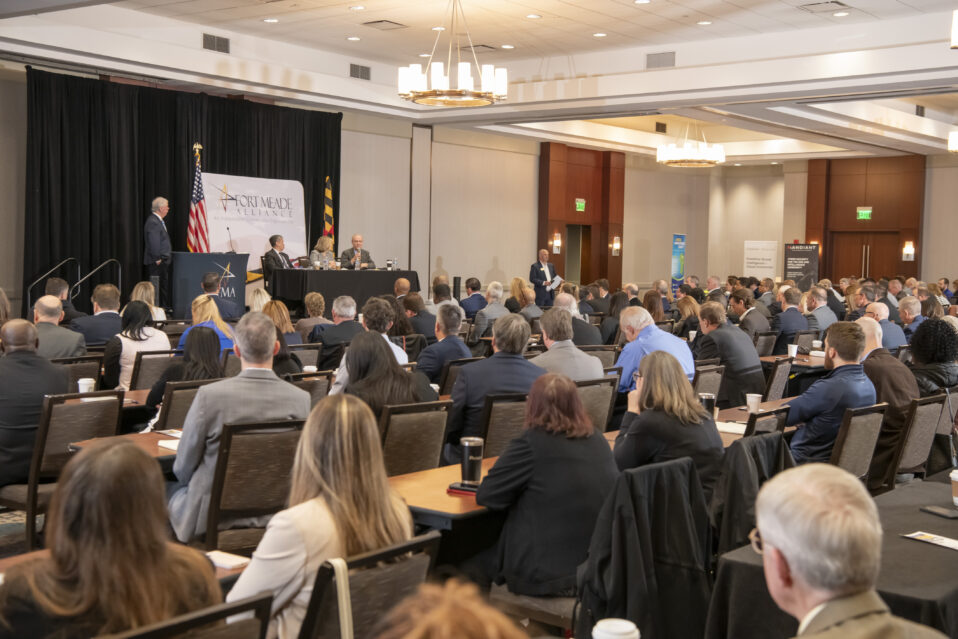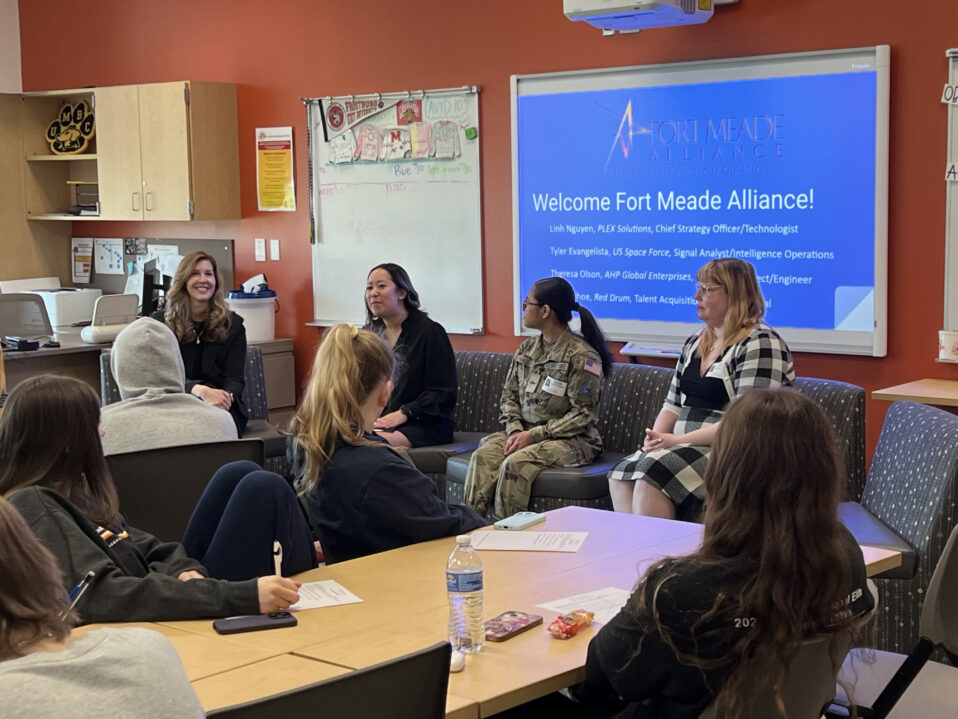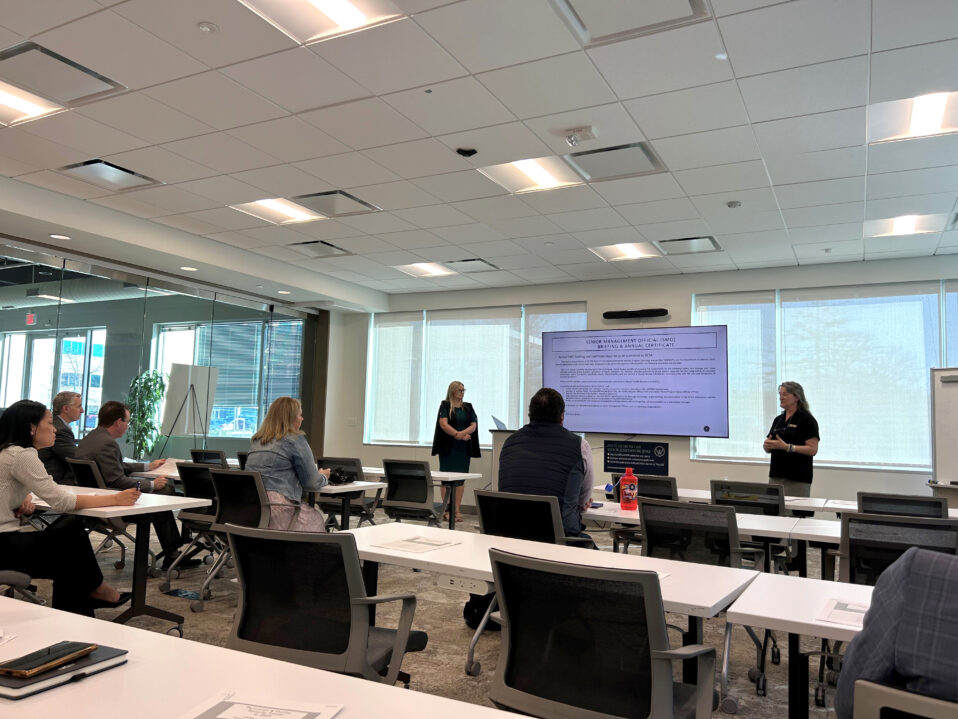As Americans scrambled to meet the challenges presented by COVID-19, professionals at Fort George G. Meade confronted an additional, daunting reality: Cyber threats and national security concerns do not wane in the face of a global pandemic. At FMA Industry Day in March, representatives of U.S. Cyber Command, the National Security Agency (NSA) and the Defense Information Systems Agency (DISA) described how their organizations soldiered through a uniquely difficult year, supported warfighters, embraced virtual operations, sustained contracting and even advanced capabilities.
“There are a lot of examples of how industry partners and government came together to make things happen. We couldn’t have gotten through the pandemic the way that DISA has without our industry partners,” said Army Major General Garrett S. Yee, Assistant to the Director of DISA.
In his keynote speech, Yee described the range of communications that DISA supports through peace time, war time and pandemics.
“When the Navy needs additional bandwidth to share x-rays between Bethesda and a hospital ship off the coast of Haiti, they call us. When a marine is caught in a fire fight and calls for artillery support through a military satellite, DISA provides that capability,” he said. “The database that houses the manuals for an Army truck mechanic, that’s DISA too. The technology that enables a Coast Guard cutter to find a civilian boat lost at sea comes from DISA as well.”
And when the just-inaugurated President of the United States needs to safely administer the oath of office to nearly 1,000 new federal officials mid-pandemic, DISA collaborates with White House staff to create a made-for-TV swearing-in ceremony via Zoom.
The pandemic required DISA to quickly execute widespread expansion of network services to support telework throughout all branches of the Department of Defense.
“Everything we did – and it was a lot – to increase the capacity for telework, to increase virtual private network capacity at our Internet access points, capacity for circuits, online security, etc. was with our industry partners,” Yee said.
That effort ensured that normal government operations continued throughout the pandemic, including contracting.
In FY 2020, DISA awarded $7.6 billion in contracting obligations – up $1.5 billion from the previous year. COVID-related support accounted for $245 million in obligations ($35 million funded through DISA), 298 unique contract awards and 59 unique vendors, nearly 50 percent of which were small businesses, Yee said. In total, DISA handled 6,700 contracts in FY 2020 and completed 56,000 contract actions or more than 1,000 actions per week, despite the pandemic.
Awards to small businesses accounted for $1.74 billion of DISA’s total contracting in FY 2020, “nearly tying an all-time record of small business awards,” said Doug Packard, DISA Procurement Services Executive and Director of the Defense IT Contracting Organization.
In 2020, U.S. Cyber Command achieved major advances in its contracting abilities. First granted contracting authority in 2015 and limited to $75 million in contracts annually, Cyber Command was freed from contracting restrictions in the FY 2021 National Defense Authorization Act.
“I am very happy to say we now have full acquisition authority and it has been made permanent. That is a huge success for the command so we are very proud,” said Sharothi Pikar, Command Acquisition Executive/J9 Director. “It really leaves the flexibility at the command acquisition organization level to respond to the command’s needs… We can go out and award more than $100 million worth of contracts if that is what we need to do.”
In FY 2020, Cyber Command awarded $22 million of contracts to small businesses alone, she added. Cyber Command is now looking to do further outreach to industry about contracting opportunities and host its own industry day this summer.
At NSA, the pandemic triggered a temporary pause in some contracting activity, prompted some contract extensions and resulted in a dip in small-business contracting. Awards to small businesses amounted to 22.7 percent of the agency’s contracting dollars, just shy of its 23-percent goal, said Dianne Dunshee, Deputy Director of Business Management and Acquisition, and Senior Acquisition Executive.
The agency, however, made advances in its contracting abilities and set the stage for future opportunities. NSA secured top-line budget increases and advanced several initiatives designed to expand its collaboration with private sector partners.
“We cut the ribbon last year on NSA’s Cyber Collaboration Center. This will expand our ability to work cyber threats with industry in an unclassified manner and bring in academia, industry, foreign governments. This marks a whole new level of activity for NSA,” Dunshee said. The agency also received “authority through DoD to do bi-directional sharing with defense industrial base partners which greatly increased our abilities to rapidly share cyber threat information.”
Already involved in eliminating obsolete encryption systems (an initiative that helped secure the 2020 election), NSA was “successful in advocating for a significant increase in investment from the department in developing new encryption equipment. You may hear this activity under two names – Crypto Modernization 2 or Next Generation Encryption – and it focuses across the fleet of technology products,” Dunshee said.
Furthermore, lessons learned from the pandemic are creating opportunities for different contract arrangements going forward. The agency identified additional work that can be completed (by government staff or contractors) through telework arrangements and “our CIO and leadership were very clear that the telework strides that we made are not simply for COVID. We expect to continue that,” Dunshee said.
Speakers at FMA Industry Day agreed that pandemic adjustments to telework and virtual meetings will create lasting opportunities for their agencies and government contractors.
“The world has changed. To expect that I can only get my business done if I see you face-to-face in your office, that’s not the new norm,” Packard said. Equipped with digital tools and broader ideas of how to collaborate, “I am convinced we will come out [of the pandemic] better professionals.”
Acquisitions executives and government contractors are already seeing some dividends from those new skills and processes. DISA 101 is now held virtually and is reaching companies across a broader geographic range, he said.
NSA is also engaging in virtual outreach to enhance its contracting. Although the number of small businesses registered with NSA grew by 200 in 2020, “a breakdown by socio-economic sub-factors…identified pockets where we need to increase the number of companies,” Dunshee said. The agency is planning to do targeted outreach and has already determined that virtual meetings will best enable them to connect with certain types of companies.




